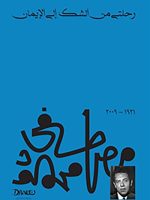This book is a collection of letters that came in response to some of the questions posed to Ibn Arabi by some of the sheikhs, scholars, and contemporaries. It also contains a collection of books that address some important Sufi ideas, such as the issue of annihilation, oneness, manifestation, beauty, the meaning of eternity, the seven heavens, the spirituality of each heaven and its specialities, the spirituality of the spheres, and other ideas that open new horizons for our understanding of religion and Sufism.
Ibn Arabi’s Letters
د.ا7.50د.ا8.00
A collection of letters written by Muhyiddin Ibn Arabi, addressing profound spiritual and philosophical topics that reflect a distinctive Sufi thought.
Available on backorder
| Categories: | Literature, Islamic literature, Messages, Philosophy |
|---|---|
| Tags: | Islam, Islamic Studies, Spirituality, thought |
| Author | |
|---|---|
| Year | |
| Publisher | Dar al-Kutub al-Ilmiyyah |
You may also like…
-
Messages from the Prophet ﷺ
د.ا13.00This book presents literary and humane reflections inspired by the Prophet’s biography and stances, in a contemporary style that touches the heart and mind.
-
Messages from the Qur’an
د.ا9.00This book contemplates the meanings of the verses of the Qur’an and presents spiritual messages and life lessons in the distinctive style of Adham Sharqawi.
-
Letters from the Companions
د.ا10.00A book that collects imaginative literary letters inspired by the biographies of the Companions, conveying meanings of wisdom, faith, and humanity.
-
My Arch Enemy
د.ا7.00The novel is an exciting story of letters that reveals the development of its heroine’s relationship with a mysterious person through the exchange of correspondence, within a framework of romance and drama.
د.ا8.00
Related products
-
Men in the sun
د.ا2.13Ghassan Kanafani is a Palestinian novelist, storyteller, and journalist, and is considered one of the most famous Arab writers and journalists in the twentieth century. His literary works, including novels and short stories, were deeply rooted in Arab and Palestinian culture
د.ا3.55 -
Returning to Haifa
د.ا2.13Ghassan Kanafani is a Palestinian novelist, storyteller, and journalist, and is considered one of the most famous Arab writers and journalists in the twentieth century. His literary works, including novels and short stories, were deeply rooted in Arab and Palestinian culture
د.ا3.55 -
Death bed number 12
د.ا3.55Ghassan Kanafani is a Palestinian novelist, storyteller, and journalist, and is considered one of the most famous Arab writers and journalists in the twentieth century. His literary works, including novels and short stories, were deeply rooted in Arab and Palestinian culture
د.ا4.97 -
The blind and the deaf
د.ا2.13Ghassan Kanafani is a Palestinian novelist, storyteller, and journalist, and is considered one of the most famous Arab writers and journalists in the twentieth century. His literary works, including novels and short stories, were deeply rooted in Arab and Palestinian culture
د.ا3.55 -
In Zionist literature
د.ا3.55Ghassan Kanafani is a Palestinian novelist, storyteller, and journalist, and is considered one of the most famous Arab writers and journalists in the twentieth century. His literary works, including novels and short stories, were deeply rooted in Arab and Palestinian culture
د.ا4.97 -
Bridge forever
د.ا2.13Ghassan Kanafani is a Palestinian novelist, storyteller, and journalist, and is considered one of the most famous Arab writers and journalists in the twentieth century. His literary works, including novels and short stories, were deeply rooted in Arab and Palestinian culture
د.ا3.55 -
Pulse
د.ا12.00A novel that sheds light on the internal conflict between mind and heart, and addresses themes of love, sacrifice, and the search for self in a world filled with challenges.
-
My journey from doubt to faith
د.ا2.13I refused to worship God because I was immersed in worshipping myself and admired the flash of light that began to flash in my mind with the opening of consciousness and the beginning of the awakening from the cradle of childhood.
This psychological state was behind the controversial scene that recurs every day. I also missed the origins of logic and I am dealing with logic and I did not realize that I am contradicting myself as I recognize the Creator and then say who created the Creator and make him a creature at the time when I call him a creator, which is sophistry itself.
Moreover, to say a first cause of existence requires that this cause must exist in itself and not dependent or need others to exist. If a cause needs a cause, this makes it one of the causal links and does not make it a first cause.د.ا3.55













Be the first to review “Ibn Arabi’s Letters”